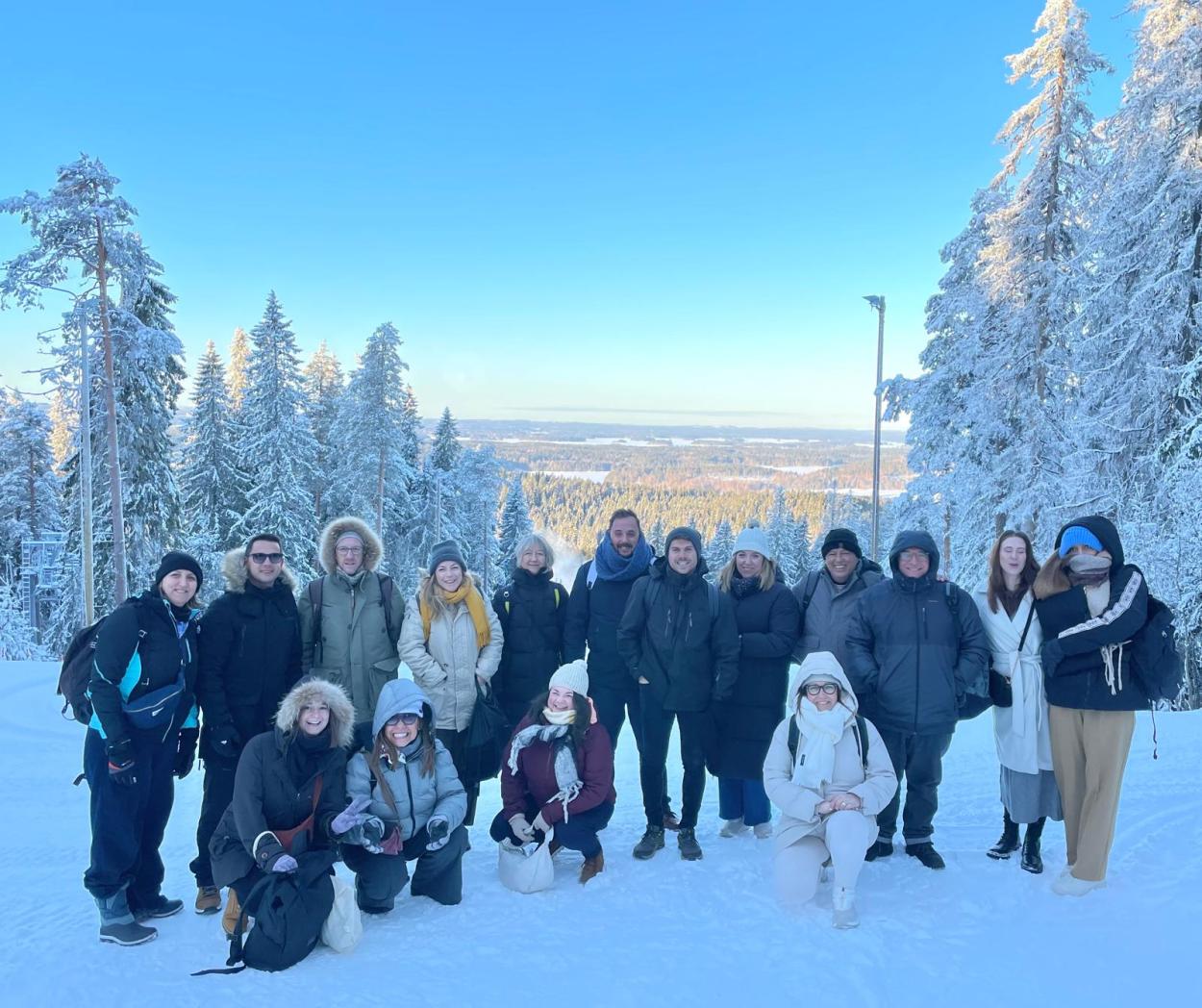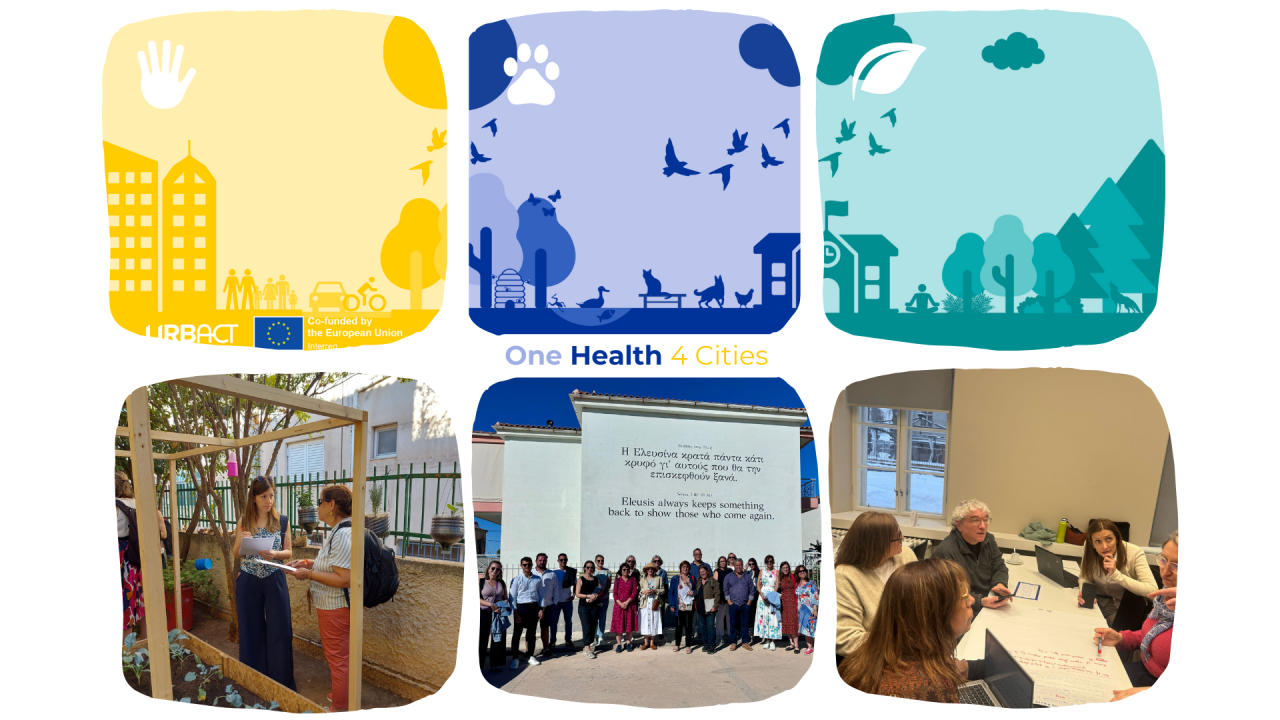Highlights from 2024
The network successfully completed two core meetings (transnational network meetings) in Lahti (FI) and Elefsina (GR), along with six cluster group meetings (3-partner meetings). Each partner also held frequent meetings with their Local URBACT Local Groups.
Key knowledge exchanges
Lahti’s Integrated Strategies: The network gathered in Lahti, Finland, to explore integrated strategies like the "Nature Step to Health" 10-year plan. Participants learned about local initiatives such as the Health Forest, engaged in the Finnish health and well-being culture and participated at the People & Planet Conference 2024.
Kuopio’s Nature and Health Initiatives: Strasbourg and Elefsina visited Kuopio, to deepen their understanding of the connection between nature and health. Highlights included exploring local practices, forest school methods, and experiencing the serene woods surrounding the city.
Active Aging in Loulé: Suceava and Benissa joined Loulé to discuss active ageing and how to foster partnerships with local private organisations.
Green Spaces in Munich: Teams from Lyon, Munich and Lahti explored how high-quality green spaces promote One Health and improve the health of the city. The visits included testing emerging tools, developing the One Health Toolbox and reviewing guidelines on integrating One Health into urban strategies.
One Health through Urban Planning in Lyon: Teams from Lyon, Munich and Lahti discussed how urban planning can promote One Health and visited various projects in the city to understand better the integrated aspects of human, animal, plant and environmental health. The group also shared advances in the One Health Impact Assessment methodology and tested the One Health Screening Tool.
Gender Sensitivity Training: The entire network participated in training sessions and made significant progress on gender and social inclusion.
Stakeholder Engagement: New ad-hoc experts guided partners on effective stakeholder engagement, which is being applied to advance integrated action plans across cities.
Citizen Engagement in Elefsina and Benissa: In Elefsina, the network partners co-created actions to enhance citizen participation, experienced how art and culture can promote One Health, and organised a One Health panel featuring Greek experts. Visits to local nurseries showcased how children can make a difference through healthy diets and food cultivation. Benissa showcased how grassroots initiatives can raise awareness of environmental and climate change issues and how the municipality can play a role in supporting such organisations.
These exchanges underscored the importance of uniting diverse stakeholders at both local and international levels. The timing proved critical, as various local and international stakeholders are moving swiftly to position cities as generators of health for all beings and their environments through One Health.
One Health Implementation Insights
1. It is time for a more coherent One Health implementation
The One Health approach—an intersectional framework addressing human, animal, and environmental health—is not new in essence, but cities are only beginning to systematise its implementation. A key takeaway is that while elements of One Health already exist in urban planning, there is a pressing need to implement One Health more systematically and collaboratively. This requires cities to boldly explore new methodologies, test innovative solutions, embrace implementation and collaborate across departments.
2. Tailoring Communication for Stakeholders
One Health is a complex topic, and its communication cannot adopt a one-size-fits-all approach. For example, decision-makers, technical experts, and community members each require messaging that is relatable and addresses specific needs. Simplifying jargon and contextualising the benefits of One Health make it more accessible and engaging to a wider audience. By reframing the narrative to emphasise relevance and practical outcomes, cities can garner stronger stakeholder buy-in. A very powerful yet simple tool to support diverse stakeholders in understanding One Health is the One Health 4 Cities role-playing, a game that was developed and tested during the planning phase. During local and international meetings with the help of the tool, we expanded our understanding, empathising variety of needs across the environment, animals and humans and found out how to design better One Health inclusive urban projects (the tool will be available online within the Essential’s Guidebook for One Health).
3. Learning Across Diverse Contexts
The network’s strength lies in its diversity. Cities small and large, advanced and nascent in their One Health journey, offer unique perspectives. Learning from each city’s context, whether from innovative successes or challenges faced, has proven invaluable and has helped the network touch and explore many One Health topics (e.g. access and quality of green spaces, overpopulation of rodents, gender inclusion etc.). Some exchanges directly turned into actionable insights for some cities. As a network, we are learning from everyone, enhancing the credibility and applicability of our outputs for all types of cities.
4. Learning from Mistakes
Some of the most memorable lessons arise from failures rather than flawless processes and best practices. Recognising and analysing mistakes fosters a culture of creative thinking for brainstorming about solutions, develops empathy and supports cities to avoid similar pitfalls. It takes courage to admit mistakes and what could have been avoided. The network’s open environment allows partners to share these challenges candidly, paving the way for collective problem-solving and progress.
5. Accelerating Volume of Experimentation
Implementing One Health does not need to be perfect from the first try. The urgency lies in accelerating experimentation and testing new ideas across various domains. Waiting for perfect solutions can delay meaningful action. We need to define and prioritise agile methodologies and learn fast. Cities will adapt and refine their approaches over time. One Health is not a fixed end goal; it is an ever-evolving process of continuous improvement.
6. Breaking Silos and Avoiding Blind Spots
Business-as-usual approaches can perpetuate blind spots and omit critical perspectives. To truly embrace One Health, cities must convene diverse experts across disciplines to ensure that decisions consider human, animal, and environmental impacts comprehensively. This holistic approach can prevent unintended consequences and maximise the benefits of urban interventions. Way too often the animal health was omitted from conversations, frequently it was an afterthought. To implement One Health, we need all aspects to be equally represented and understood.
What is next
The planning phase of the One Health 4 Cities Network has equipped partner cities with valuable insights and actionable ideas. Looking ahead, the network aims to:
- Developing Tools and Guidelines: The network is focused on collecting and developing comprehensive tools and guidelines for implementing the One Health approach in strategies and urban projects. Together with experts and city partners, we are creating the "Essentials Guidebook on One Health for City Makers", a practical resource filled with tips and tools to help more public authorities embark on their One Health journey.
- Strengthening Internal Connections: The network seeks to foster stronger relationships among partner cities and local groups through regular meetings, workshops, and study visits, promoting a culture of collaboration and shared learning.
- Widen expert external collaborations: By engaging a broader range of stakeholders, projects and experts in our activities, the network aims to enrich collective learnings and open to new opportunities for collaboration across diverse fields.
- Testing Actions and Integrated Action Plans: The network cities are actively developing and testing their One Health approaches, a process that will intensify and conclude in 2025. This effort aims to gather valuable learnings and lay the groundwork for comprehensive One Health implementation.
- Advocating for One Health: The network is dedicated to raising awareness about the importance of the One Health approach among EU institutions, policymakers, and decision-makers to ensure it becomes a priority on the public agenda at the EU and national levels.
By continuing to build on the momentum generated during the planning phase, the One Health 4 Cities Network is leading the way in creating healthier, more sustainable urban environments for all.
For additional information and collaboration contact Marlène Dussauge, Network Coordinator (Marlene.Dussauge@mairie-lyon.fr) and Sofia Aivalioti, Lead Expert (s.aivalioti@baxcompany.com).


